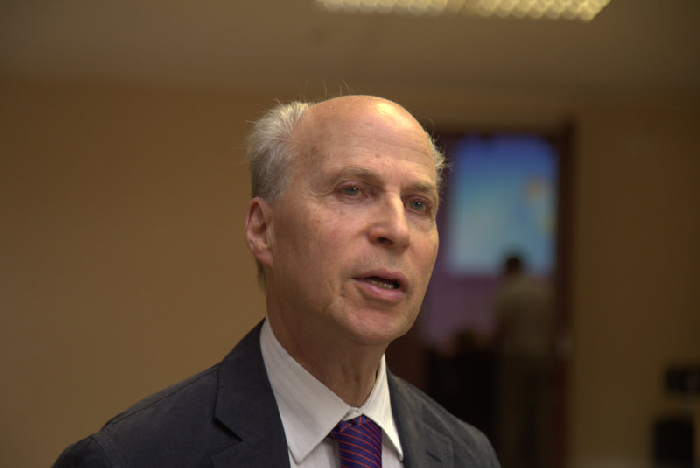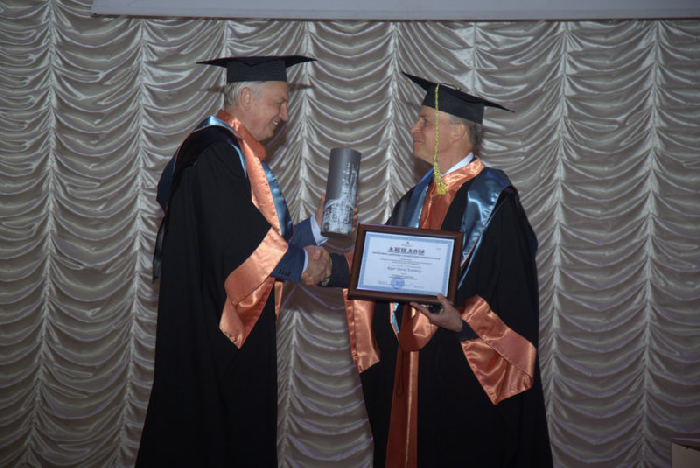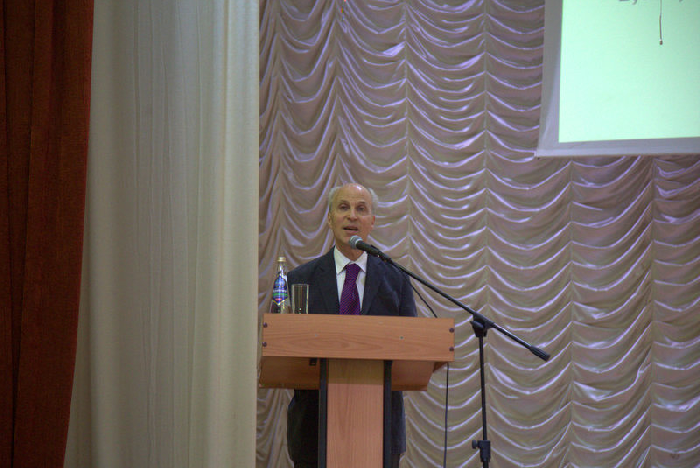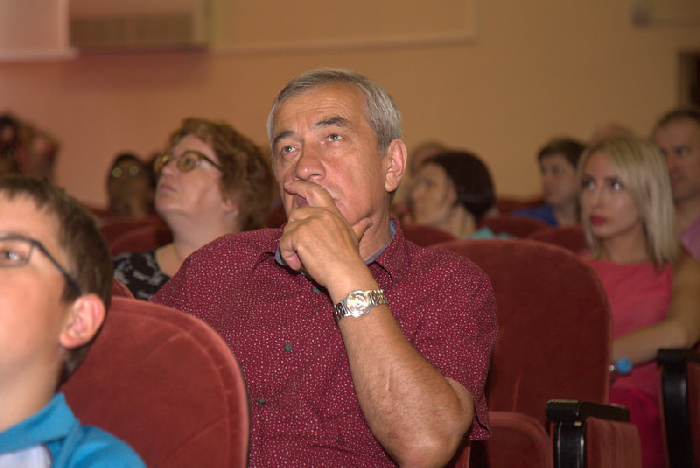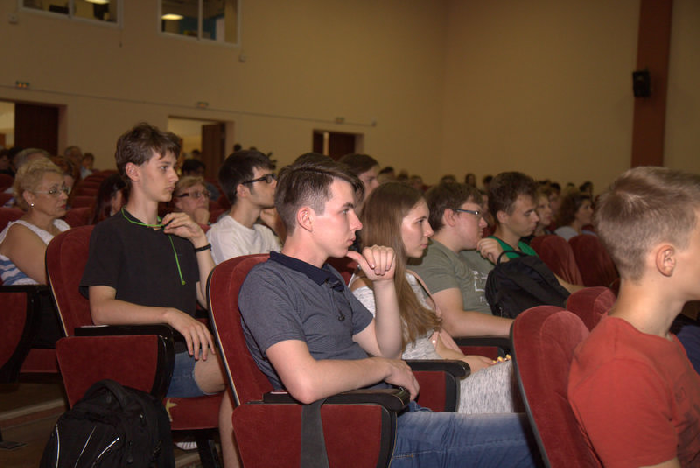Samara University continues the tradition of open lectures of Nobel Prize laureates. On Monday, July 9, the Nobel laureate in Chemistry, Professor of Stanford University Roger David Kornberg addressed to the audience in Samara University.
By the decision of the Academic Council he was awarded the title of "Honorary Doctor of Samara University" — the solemn ceremony was held before the beginning of the lecture. "It is very important for us that such an outstanding scientist became one of the honorary doctors of Samara University," — Rector Evgeniy Shakhmatov addressed to the Nobel laureate. "I will be honoured to wear this title," — said Roger David Kornberg. He expressed the joy that he joined the number of the leading scientists of Samara University.
Roger David Kornberg is a well-known researcher descended from a family of the Nobel laureate. In 1959 his father Arthur Kornberg received the Nobel Prize in Physiology and Medicine for the discovery of how genetic information is transferred from a mother cell to its daughters. In 2006 Roger David Kornberg became the Nobel laureate for his studies of how the genetic information is copied from DNA into what is called messenger-RNA. As a result of many years of research, he defined the structure of RNA polymerase II, an enzyme that is responsible for reading practically all genetic information from organisms that have a nucleus.
Today, in his lecture "Genetic Targets for the Creation of Medicine: Can Humanity Fight Diseases", the professor shared the results of work carried out for 40 years. Scientists have tried to understand the basis of gene regulation, namely: how information contained in the human genome determines the form and functioning of the body. All the information that is contained in the human genome is in the DNA molecule. It performs two functions. The first function is hereditary, when the information is copied into each daughter cell and an identical copy is created with each cell division. The second function is the expression of information. This happens in two stages: copying and translating this information into protein and the protein directly transfers the information to each new cell.
"Having the ability to modify certain mechanisms associated with DNA or with transcription of protein, we can prevent diseases, — says Roger David Kornberg. — Working with DNA, we will be able to fight both hereditary diseases and diseases associated with DNA mutation, and with viral diseases".
The Nobel laureate stressed that viruses pose a serious threat to humanity. At present the treatment exists for only two types. Hepatitis, influenza, URTI, fever, norovirus, Dengue virus is a small list of dangerous viruses that cause the loss of millions of lives. The virus is a simple organism consisting of a genome surrounded by a protein membrane and a polymerase for division.
The poor efficacy of current medicine is due to the fact that they cannot cope with continuous changes in viruses. They affect the protein. While drugs that affect RNA polymerase, will not be subject to the evolution of viruses. If it is possible to develop a mechanism for suppressing the polymerase of the virus, which will not affect the human polymerase, humanity will be able to defeat all viruses and diseases at once. This statement is based on the discovery of similarity of RNA polymerases in all living organisms.
"My studies did not have any medical goals, but the received information is fundamental, so it can be used to develop the methods of treatment. To solve the most complicated problems in medicine it is necessary to investigate the nature of things, the very essence, it will allow solving the most important medical problems", — the Nobel laureate noted.
The lecture of Professor Roger David Kornberg was held within the framework of the visiting session of Skolkovo Foundation's Advisory Scientific Council, which takes place on July 9-10 at Samara University.
When responding to media questions the famous scientist stressed that the place for the scientific collaboration wasn’t chosen by chance. "Skolkovo" is not a territory, it is an ideology. "Skolkovo" was created to revive Russian science. In Russia there are longstanding scientific traditions, numbering hundreds of years, — said the co-chairman of the Scientific Council of the Foundation. Unfortunately, Russian science was seriously damaged during the perestroika period, when the support from the state almost ceased. For the revival of scientific traditions "Skolkovo" was created. However, in Russia science exists not only in Moscow, that is why the visiting sessions of the Advisory Scientific Council are held in other cities. Historically, Samara is one of the centres of scientific thought in Russia, therefore it is natural that we came here".
For reference
Roger David Kornberg as well as the RAS academician, Nobel laureate Zhores Alferov is a co-chairman of the Scientific and Technical Council of Skolkovo Innovation Centre.
On July 9-10 in Samara there is a visiting session of the Skolkovo Foundation's Advisory Scientific Council, attended by both Nobel laureates. In the Advisory Scientific Council there are five research clusters, in accordance with the priority areas of the innovative project "Skolkovo" — Information Technologies, Biomedical Technologies, Energy Efficient Technologies, Space Technologies and Telecommunications, Nuclear Technologies.
Photo: Natalia Orlova
